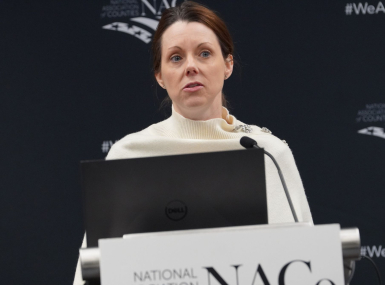The Social Services Block Grant Can Help Counties Respond to the COVID-19 Emergency
Author
Upcoming Events
Related News

Key Takeaways
As the coronavirus pandemic persists, the local health and human services safety-net is facing unprecedented pressure for emergency services. Not only do counties support over 1,900 local public health departments, nearly 1,000 public hospitals and critical access clinics, more than 800 long-term care facilities and 750 behavioral health centers, we also deliver essential human services across the country. With counties on the front lines responding to the far-reaching health, safety and economic consequences of the COVID-19 emergency, our federal partners can offer crucial support by providing supplemental funding for the Social Services Block Grant (SSBG).
SSBG is a uniquely flexible federal funding stream for states and counties, requiring no local match and supporting nearly 30 different types of services to promote self-sufficiency, eliminate dependency, prevent child abuse, support community-based care for the elderly and disabled and support institutional care when necessary. Nine states pass SSBG funds directly to counties: Colorado, Minnesota, New York, North Carolina, North Dakota, Ohio, Pennsylvania, Virginia and Wisconsin, though counties in other states can access SSBG funds as well. According to a NACo analysis of Federal Audit Clearinghouse data, counties utilized over $763 million in SSBG funds between Fiscal Year (FY) 2014 and FY 2016 to serve our communities.
SSBG’s flexibility makes it ideally suited to help local governments adapt quickly and appropriately to the COVID-19 emergency. In 2013, Congress provided supplemental SSBG funding to states impacted by Hurricane Sandy, supporting services such as meal delivery, emergency transportation, services for the disabled, adult protective services, home based care, health services, employment services, child care and more. Importantly, for each state, service priorities changed throughout the crisis and reflected the progression of disaster recovery needs from immediate concerns to long-term recovery, with the Department of Health and Human Services confirming that “every program filled community needs in the wake of the disaster”. Similarly, SSBG has been a powerful tool to help states and localities respond to other public health crises, such as the opioid epidemic.
Now, not only are public health systems and hospitals overloaded, but as unemployment numbers skyrocket and economic hardship worsens, county residents are turning to human services agencies in unprecedented numbers to access emergency resources. At the same time, business closures and safer at home policies mean local general revenue funds — which counties often use to supplement federal and state funding for human services such as foster care, child care, homeless services, health services and more — are declining dramatically.
Against this backdrop, emergency SSBG funds would provide a critical bridge for state and local governments working to provide emergency services to impacted residents and adapt to the changing needs of our most vulnerable residents.
NACo will continue working with Congress to secure emergency funding for SSBG and other forms of direct financial relief for county governments responding to the COVID-19 pandemic.

Attachments
Related News

National Association of Counties Launches Initiative to Strengthen County Human Services Systems
The National Association of Counties (NACo) announces the launch of the Transforming Human Services Initiative, a new effort to help counties modernize benefits administration, integrate service delivery systems and strengthen county capacity to fulfill our responsibility as America’s safety net for children and families.

Congress seeking ‘common-sense solutions’ to unmet mental health needs
Rep. Andrea Salinas (D-Ore.): “Right now, it is too difficult to access providers … and get mental health care in a facility that is the right size and also the appropriate acuity level to meet patients’ needs.”

Federal-level child welfare priorities center on supporting foster youth, families
Child welfare experts outlined current priorities at the federal level, including better supporting foster care youth who age out of the system and recruiting more foster parents, at NACo’s Human Services and Education Policy Steering Committee meeting.
